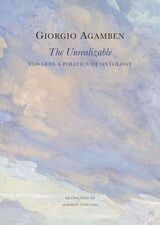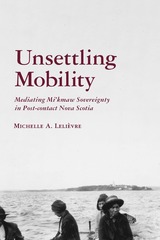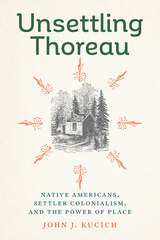116 scholarly books by Omnidawn and 13
start with S
116 scholarly books by Omnidawn and 13
116 scholarly books by Omnidawn
13 start with S start with S
13 start with S start with S

Saga / Circus
Lyn Hejinian
Omnidawn, 2008
Saga / Circus, by the esteemed poet Lyn Hejinian, brings us two distinctly different long poems in which the tropes of narrative and lyric—their feints and demands—stake claims amongst the actual characters presented. In this playful yet penetrating pair of poems, it is the character of Lyn Hejinian's thought meeting our character of thought that is one of the most exciting and most constant dramatic events of the book—the richly sensational & subversive crescendos register as both melodic and discordant soundtrack.
[more]
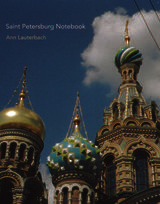
Saint Petersburg Notebook
Ann Lauterbach
Omnidawn, 2014
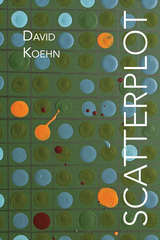
Scatterplot
David Koehn
Omnidawn, 2019
Scatterplot navigates a vast landscape of imagination through variations on being lost and found. David Koehn’s investigative journeys allow space for the failures of consciousness and gaps in the knowable as he traverses a sensory terrain through the shadow of natural history and the glow of the family room TV. In this wilderness is a father and son walking the sloughs of the California delta, searching through the mayhem of a world dismissive of, but also requiring, love.
Koehn diagrams connections from media, art, film, music, nature, history, and his own family into a web of coordinates that form constellations of beauty and tragedy. He moves from the music of the Bad Brains, to the grotesque lifecycle of the Tongue-Eating Louse, to the deconstruction of Mutant Mania toys, and on through the poems of David Antin and the suicide of Anthony Bourdain, building a fantastical world from the wild realities of the real one. In a universe so full of imperfection one can’t help but both laugh and cry, the poet embraces the present while taking responsibility for his own insufficiencies. Amounting to a mix of experiments—erasures, surreal narratives, collage, walking poems, and more—the delta between right now and forever feels both inescapably present and delightfully confused. Immense vulnerability, infinitely odd observations, and uninhibited daring populate the psychological terrain in the poems of Scatterplot as Koehn invites us to join his spiraling poetic exploration.
Koehn diagrams connections from media, art, film, music, nature, history, and his own family into a web of coordinates that form constellations of beauty and tragedy. He moves from the music of the Bad Brains, to the grotesque lifecycle of the Tongue-Eating Louse, to the deconstruction of Mutant Mania toys, and on through the poems of David Antin and the suicide of Anthony Bourdain, building a fantastical world from the wild realities of the real one. In a universe so full of imperfection one can’t help but both laugh and cry, the poet embraces the present while taking responsibility for his own insufficiencies. Amounting to a mix of experiments—erasures, surreal narratives, collage, walking poems, and more—the delta between right now and forever feels both inescapably present and delightfully confused. Immense vulnerability, infinitely odd observations, and uninhibited daring populate the psychological terrain in the poems of Scatterplot as Koehn invites us to join his spiraling poetic exploration.
[more]
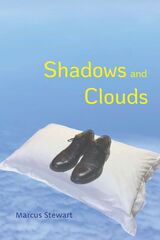
Shadows and Clouds
Marcus Stewart
Omnidawn, 2023
Stories that question our experience of time, truth, and memory.
Through the stories in Shadows and Clouds, Marcus Stewart invites us to consider how things are not always as they appear or as we remember them, instead locating reality in the imagination and the dream world. While animals understand the world without words, humans create our experiences as stories, translating past and future into tales told in the present. Stewart's stories take the notion of storytelling and expand to a consideration of how truth, misremembering, logic, lying, and uncertainty play together to affect our experience of reality. In an alternate reading of time, Stewart poses the suggestion that you may already have a future memory of reading this book, and reading the stories backward may bring us back to the present.
Shadows and Clouds is the winner of the 2021 Omnidawn Fabulist Fiction Chapbook / Novelette Contest, chosen by Theodora Ziolkowski.
Through the stories in Shadows and Clouds, Marcus Stewart invites us to consider how things are not always as they appear or as we remember them, instead locating reality in the imagination and the dream world. While animals understand the world without words, humans create our experiences as stories, translating past and future into tales told in the present. Stewart's stories take the notion of storytelling and expand to a consideration of how truth, misremembering, logic, lying, and uncertainty play together to affect our experience of reality. In an alternate reading of time, Stewart poses the suggestion that you may already have a future memory of reading this book, and reading the stories backward may bring us back to the present.
Shadows and Clouds is the winner of the 2021 Omnidawn Fabulist Fiction Chapbook / Novelette Contest, chosen by Theodora Ziolkowski.
[more]
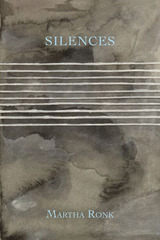
Silences
Martha Ronk
Omnidawn, 2019
Within the visual arts of painting and photography, Martha Ronk finds an undeniable presence lurking: silence. This character slips into pauses, hides between images, and expertly evades the grasp of language. Ronk shows us that what is hidden just off screen in these images might just be the force that gives them power. The poems in Silences seek possibilities of how to form language from a phenomenon that so earnestly resists it. Rather than coax silence out of hiding, Ronk’s poems respond to its mysterious presence through questions and conjecture.
These poems endeavor to give a much-deserved voice to silence, addressing the power of what is not seen. While silence remains perpetually out of reach, Ronk invites us to follow the language that creeps up to its edges. The poems in this collection form an inquiry that moves through the presence of silence and reveals insights into the character of the visual art in which it lives.
These poems endeavor to give a much-deserved voice to silence, addressing the power of what is not seen. While silence remains perpetually out of reach, Ronk invites us to follow the language that creeps up to its edges. The poems in this collection form an inquiry that moves through the presence of silence and reveals insights into the character of the visual art in which it lives.
[more]

Since Sunday
Brittany Tomaselli
Omnidawn, 2019
What happens when the faith and community we once held close sours into an experience of tragedy? In Since Sunday, we find a poet who is rebuilding a sense of faith after fleeing religious abuse. Doubt, shame, uncertainty, and the pains of loss create the ground from which these poems grow. After severance from her religion, established values, and sense of direction, Tomaselli embarks on recovery as an active and intentional pursuit. The poems reveal a resilience that must be lived as a daily effort to cope with trauma and to root oneself in the present.
Through wit, vulnerability, and rich lyrical language, Tomaselli invites us to walk with her through loss and on to a persistent process of discovery. The poems chronicle a cultivation of awe, unearthing a fresh faith rooted in the present realness of everyday experiences. Stripped of the orthodoxy that both grew and crushed her, she reconstructs a new core of trust for herself. Here we learn with the poet to seek celebration in daily life and to foster a sense of beauty from the mundane.
Through wit, vulnerability, and rich lyrical language, Tomaselli invites us to walk with her through loss and on to a persistent process of discovery. The poems chronicle a cultivation of awe, unearthing a fresh faith rooted in the present realness of everyday experiences. Stripped of the orthodoxy that both grew and crushed her, she reconstructs a new core of trust for herself. Here we learn with the poet to seek celebration in daily life and to foster a sense of beauty from the mundane.
[more]
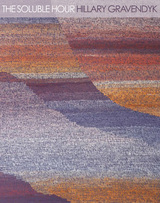
The Soluble Hour
Hillary Gravendyk
Omnidawn, 2017
In Hillary Gravendyk’s The Soluble Hour, the speaker sings with visionary passion how the beloved and dear ones will soon be without her and laments for their imminent grief. But being in extremis pulls the voice towards testimony of unquestioned love, a recollection of landscapes Californian and otherwise, and previous selves. The poet wields her deep solitude as the measure of truth and conviction, the self that accepts its own impermanence.
[more]
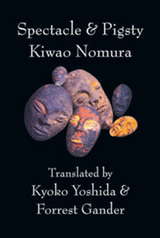
Spectacle & Pigsty
Kiwao Nomura
Omnidawn, 2011
If you think of haiku when you think of Japanese poetry, this book will be a huge surprise. The strange and wild poems of Kiwao Nomura deal with sex and loss and memory by making unpredictable leaps of association. Imagine Fugazi singing philosophy and you get close. Inspired by shamanism, Kiwao Nomura sounds like nothing you’ve ever heard before and like something you want to hear over and over. He is one of the two or three of the most influential living Japanese poets, and his work will be as stunningly original and compelling to contemporary Americans as haiku was to the late Victorians. Anyone interested in making contact with Japanese culture will want to read Spectacle & Pigsty.
[more]

Squander
Elena Karina Byrne
Omnidawn, 2016
Squander occupies a place where “the mind’s upstairs windows [are] blown out”: a place of juxtapositional delight through sensory and conceptual dislocation. Poems based in word origins work as fables, and poems based in dialogue work within a select concordance from authors and artists. The consequent subject’s meaning is diverted and new vantage points are created. Squander’s energized music, its alliance with feeling’s final rhythm “makes us complicit” in the re-awaking of language.
[more]
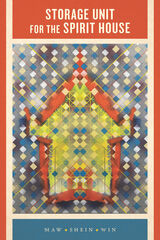
Storage Unit for the Spirit House
Maw Shein Win
Omnidawn, 2020
With sharp focus and startling language, the poems in Maw Shein Win’s second book, Storage Unit for the Spirit House, look through physical objects to glimpse the ephemeral, the material, and the immaterial. Vinyl records, felt wolverines, a belt used to punish children, pain pills, and “show dogs with bejeweled collars” crowd into Win’s real and imagined storage units. Nats, Buddhist animist deities from her family’s homeland of Burma, haunt the book’s six sections. The nats, spirits believed to have the power to influence everyday lives, inhabit the storage units and hover around objects while forgotten children sleep under Mylar blankets and daughters try to see through the haze of a father’s cigarette smoke.
Assemblages of both earthly and noncorporeal possessions throughout the collection become resonant and alive, and Win must summon “a circle of drums and copper bells” to appease the nats who have moved into a long-ago family house. This careful curation of unlikely objects and images becomes an act of ritual collection that uses language to interrogate how pain in life can transform someone into a nat or a siren that lives on. Restrained lines request our imagination as we move with the poet through haunted spaces and the objects that inhabit them.
Assemblages of both earthly and noncorporeal possessions throughout the collection become resonant and alive, and Win must summon “a circle of drums and copper bells” to appease the nats who have moved into a long-ago family house. This careful curation of unlikely objects and images becomes an act of ritual collection that uses language to interrogate how pain in life can transform someone into a nat or a siren that lives on. Restrained lines request our imagination as we move with the poet through haunted spaces and the objects that inhabit them.
[more]
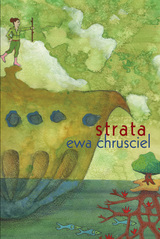
Strata
Ewa Chrusciel
Omnidawn, 2018
In Ewa Chrusciel’s first book in English, Strata, an exile’s memories are . . . at once a rapture of possession (of being possessed) and defeatingly untotalizable. Strata is . . . a tumultuous revelation of how much of the past there still is, right here in the near flight of letters, and of the burn of being in time at all, the difficulty of catching up with oneself in a universe that is never one, but always scattered. Strata is a book of concuspiscences, of combings for pleasures, yes, but even more for the Sacred Book it wants to be. In its every line, it shows that the rhapsodic is the right approach to the truth about the world. —from the foreword by Calvin Bedient Praise for Ewa Chrusciel’s poetry “With a wonderful insistence, each phrase in Ewa Chrusciel’s prose poetry can be experienced as a moment of transition, of what Emerson would have called a darting aim. “Whenever we visited, my grandfather would put his chair on the road and wait,” Chrusciel writes. “Kraina na Bosaka. We were the apparition of deer. Pray, why chase each stalk of wounded light?”’ —Tony Brinkley, Boston Review
[more]
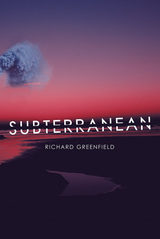
Subterranean
Richard Greenfield
Omnidawn, 2018
The elegies that comprise Richard Greenfield’s third book of poems, Subterranean, open the rhetoric of the form in new ways, creating a site of grieving that transcends a focus on the death of the father. Though lyrical, these elegies juxtapose the collapse of hyper-economies against the collapse of ecosystems, exploring the overlap, or edge effect, of liminal encounters between the living and the dead, between the city and the wilderness, between the human and the animal, and between the haves and the have nots. Greenfield creates a sequence of associative, anxious, rambling, and digressive meditations bridging these harrowing divides and exposing the loneliness of grief and empty promise of connection in the age of late capitalism. Greenfield asks, “Do you want to call someone?” The human voice, transmitted through the cell phone, becomes a spectral voice and streams “up from the basin to the peak and its antenna and striates and sieves through solid structures to arrive in the spiral of the ear of anyone.
[more]
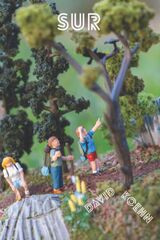
SUR
David Koehn
Omnidawn, 2024
Poetry that explores wildness and composes a landscape of complex human emotions.
Drawing on a range of stylistic influences, the poetry of Sur takes on the essence of connection and the ways in which we continually develop meaning about others and to the natural world. With this collection, David Koehn paints a landscape where wilderness intertwines with human emotions and grows between ill-fitting interpersonal connections. Sur invites readers to step back and look critically at their world while remaining intimately intertwined with it. Throughout, imagery of nature—like a snake drinking from a stream, or a mountain god—blends with the emotional landscape of tumultuous relationships, exploring themes of wildness and an inevitable unraveling of secrets.
Drawing on a range of stylistic influences, the poetry of Sur takes on the essence of connection and the ways in which we continually develop meaning about others and to the natural world. With this collection, David Koehn paints a landscape where wilderness intertwines with human emotions and grows between ill-fitting interpersonal connections. Sur invites readers to step back and look critically at their world while remaining intimately intertwined with it. Throughout, imagery of nature—like a snake drinking from a stream, or a mountain god—blends with the emotional landscape of tumultuous relationships, exploring themes of wildness and an inevitable unraveling of secrets.
[more]
READERS
Browse our collection.
PUBLISHERS
See BiblioVault's publisher services.
STUDENT SERVICES
Files for college accessibility offices.
UChicago Accessibility Resources
home | accessibility | search | about | contact us
BiblioVault ® 2001 - 2024
The University of Chicago Press


